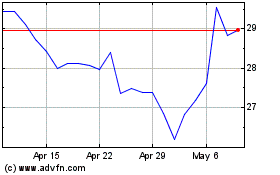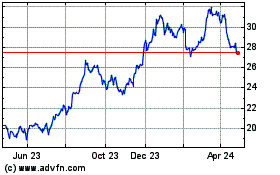Non-Oil Surplus Limits Mexico's October Trade Deficit
November 25 2016 - 10:50AM
Dow Jones News
MEXICO CITY—Mexico's trade deficit narrowed in October from the
previous month and from a year earlier as a surplus in trade of
non-petroleum goods partially offset the continued petroleum
deficit.
Exports fell 4.4% from October 2015 to $32.59 billion, and
imports fell 5.9% to $33.49 billion, the National Statistics
Institute said Friday. The $900 million deficit was smaller than
September's $1.6 billion trade gap, and the $1.5 billion shortfall
in the year-earlier month.
The trade deficit has widened over the past two years as a
result of low crude oil prices and a decline in Mexican oil-export
volume, coupled with increased imports of natural gas, gasoline and
diesel, mostly from the U.S., which has turned Mexico into a net
petroleum importer. Petroleum accounted for $10 billion of the
$13.36 billion trade deficit in the first 10 months of the year.
Both exports and imports rose in October.
The non-petroleum trade balance has improved, however, with
manufactured goods accounting for 90% of total exports. Mexico had
a $106 million surplus in non-petroleum goods trade in October,
narrowing the non-oil deficit to $3.37 billion in the first 10
months of the year, the smallest in two decades.
The Bank of Mexico expects the trade deficit to end this year at
$15.2 billion, or 1.5% of gross domestic product, but forecasts a
narrower $12.6 billion trade gap in 2017.
The central bank's projections acknowledge the risk that the
administration of U.S. President-elect Donald Trump could adopt
policies that jeopardize cross-border production chains, "even if
those policies are contrary to the interests of our northern
neighbor itself."
Still, the bank's base-case scenario is that commercial
relations between Mexico and the U.S. will continue to work
well.
If rising oil prices don't help reduce Mexico's trade deficit,
the country will rely on manufactured exports to narrow the gap,
hence the risk from U.S. protectionist threats that could lower the
benefits to Mexico of a pickup in U.S. industry, UBS said in a
recent report.
The peso's roughly 40% depreciation in the past two years hasn't
helped manufacturing exports much, partly because Mexico imports
many of the components it uses for final assembly. "What matters
more than price to Mexican manufacturing volumes is that U.S.
demand be strong, and that has not been the case in recent
quarters," UBS added.
Mexican exports of factory-made goods fell 6.1% in October from
a year before, and were down 2.9% in the first 10 months of the
year.
Mr. Trump has said he would seek to renegotiate the North
American Free Trade Agreement to secure better terms for the U.S.,
or abandon the agreement which he blames for job and factory losses
in the U.S.
He made no mention of Nafta this week, however, when announcing
his intention to order a U.S. withdrawal from the Trans-Pacific
Partnership on taking office.
The content or scope of a Nafta renegotiation isn't yet
clear.
Mexican President Enrique Peñ a Nieto told reporters this week
that his government will discuss a new agenda in the bilateral
relationship once Mr. Trump takes office in January, including
"sensitive issues" for both sides, but reiterated Mexico's
commitment to free trade.
Mexico wants to expand commerce with all 46 countries with which
it has trade agreements, but "evidently the agreement with North
America will continue to be a central issue," he said.
Mr. Peñ a Nieto had a controversial meeting with Mr. Trump in
Mexico City in late August, during the U.S. presidential
campaigns.
Write to Anthony Harrup at anthony.harrup@wsj.com
(END) Dow Jones Newswires
November 25, 2016 10:35 ET (15:35 GMT)
Copyright (c) 2016 Dow Jones & Company, Inc.
UBS (NYSE:UBS)
Historical Stock Chart
From Mar 2024 to Apr 2024

UBS (NYSE:UBS)
Historical Stock Chart
From Apr 2023 to Apr 2024
